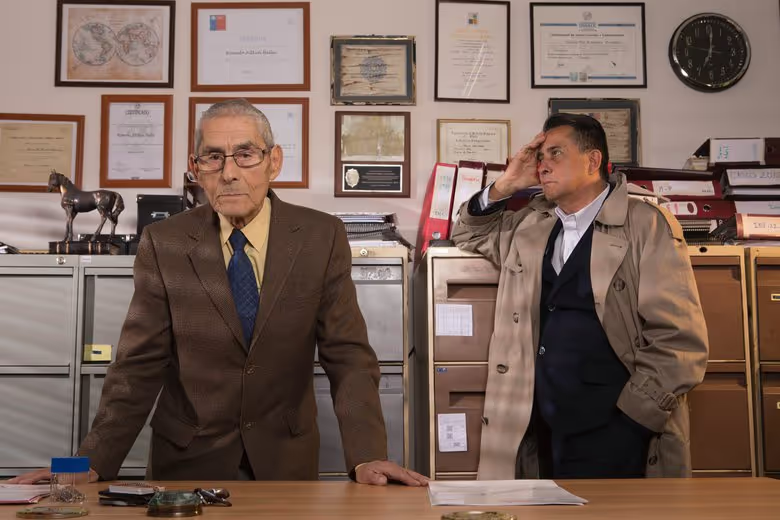The Mole Agent: Rethinking Old Age Extensions
Extensions

Re-Thinking the Science of Aging
There’s a saying that “age is just a number,” but as we’ve learned, the way age is measured can have a huge impact on how we are perceived, how public policy is shaped, and what resources and opportunities are available to us. Age may just be a number, but for better or worse, that number really matters.
In the early 2000s, population researchers Sergei Scherbov and Warren Sanderson challenged the way we measure age by presenting a new model that flips our understanding of age on its head. While traditional chronological age measures the time that has passed since we were born, their model “prospective age” measures the number of years an individual reasonably has left. Old, by their definition, is the age when the remaining life expectancy is less than 15 years.
Scherbov gave the following example to the Washington Post in 2019:
“[I]magine a 60-year-old woman in Japan, where life expectancy for women at 88 is the longest in the world; she shouldn’t be considered old until age 73. By contrast, a woman in Sierra Leone, the nation with the shortest life expectancy for women, at 72 years, is considered old at 57.”
Students will :
- Examine the concept of “perspective age” and understand how it is being applied to to real-world issues
- Investigate other models for measuring age and life expectancy such as the Old Age Dependency Ratio, the Zip Code/Life Expectancy Indicator, the significance of handgrip strength measurements, and the influence of social attitudes about ageing
- Understand the arguments for and against revising how age is measured
- Identify the measurement for ageing they feel is most useful and provide evidence and reasoning that supports their choice
- Present their research in a persuasive essay, as part of a class debate, and/or as an infographic that illustrates their argument
Resources:
- International Institute for Applied Systems Analysis. "New definition for old age." ScienceDaily. ScienceDaily, 12 December 2013.
www.sciencedaily.com/releases/2013/12/131212100144.htm - Petrow, S. “An ageless question: When is someone ‘old’?” The Washington Post. June 17, 2019.
https://www.washingtonpost.com/health/an-ageless-question-when-is-someone-old/2019/06/14/9ecad1f4-87ad-11e9-98c1-e945ae5db8fb_story.html - Glenn C. Altschuler Ph.D., “How Old Is Old? A book offers a new approach to conceptualize and measure old age.” Psychology Today. psychologytoday.com, Jan 07, 2020.
https://www.psychologytoday.com/ca/blog/is-america/202001/how-old-is-old - Amanda Loudin. “What your grip says about your odds of surviving a health crisis,” The Washington Post, June 15, 2019.
https://www.washingtonpost.com/health/what-your-grip-says-about-your-odds-of-surviving-a-health-crisis/2019/06/14/76eff7b2-77f0-11e9-bd25-c989555e7766_story.html - “Life Expectancy: Could where you live influence how long you live?” Life Expectancy by Zipcode. Robert Wood Johnson Foundation, last updated January 2020.
https://www.rwjf.org/en/library/interactives/whereyouliveaffectshowlongyoulive.html - Warren C. Sanderson, Sergei Scherbov. Prospective Longevity: A New Vision of Population Aging. Harvard University Press, 2019.
https://books.google.com/books?id=g9y0DwAAQBAJ&source=gbs_navlinks_s
A Re-design for Ageing
Write “What do you want to do when you grow old?” on the board and explain: From the time when we’re old enough to talk, people begin asking us what we want to be when we grow up, but has anyone ever asked you what you want to be when you get “old”? How would you answer that question? What do you want your life to be like when you are older?
- Have each student define what quality of life would mean to them and provide specific details that illustrate what an ideal late life would look like:
- Where would they live?
- Who would they live with?
- What would their community be like?
- How would they spend their days?
- Who would they interact with?
- What activities would they enjoy?
- Then have students shift their focus to the responsibilities that come with ageing:
- How will they get around?
- How would their basic needs be met (grocery shopping, clothing, housing, bills, cleaning/cooking, etc.)?
- How will they pay for health care?
- Who will help them if they have special needs?
- Remind students that just as they need to prepare for “what they want to be when they grow up”, they also need to prepare for their later years.
- How will you prepare for later life (for example: after 65)?
- What training or education will you want to pursue to help you achieve your goals?
- How can you arrange for the support you need before you are a senior?
- How will you support your friends and loved ones during this time?
- How will you save money for the time when you stop working?
- What resources will you expect the government to provide? What can you do to make sure those resources are available for you later in life?
- What will be your biggest challenge as work to accomplish your goals? How would you like to face that challenge? What action can you take to prepare in advance?
- Have students present their Re-Design for Ageing plan as a multimedia slide deck or infographic.
